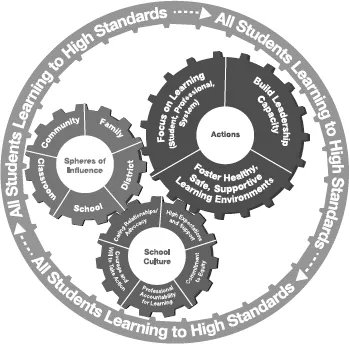
Disrupting Poverty
Five Powerful Classroom Practices
Kathleen Budge, William H. Parrett
- 176 Seiten
- English
- ePUB (handyfreundlich)
- Über iOS und Android verfügbar
Disrupting Poverty
Five Powerful Classroom Practices
Kathleen Budge, William H. Parrett
Über dieses Buch
Drawing upon decades of research and myriad authentic classroom experiences, Kathleen M. Budge and William H. Parrett dispel harmful myths, explain the facts, and urge educators to act against the debilitating effects of poverty on their students. They share the powerful voices of teachers—many of whom grew up in poverty—to amplify the five classroom practices that permeate the culture of successful high-poverty schools: (1) caring relationships and advocacy, (2) high expectations and support, (3) commitment to equity, (4) professional accountability for learning, and (5) the courage and will to act.
Readers will explore classroom-tested strategies and practices, plus online templates and exercises that can be used for personal reflection or ongoing collaboration with colleagues. Disrupting Poverty provides teachers, administrators, coaches, and others with the background information and the practical tools needed to help students break free from the cycle of poverty.
Häufig gestellte Fragen
Information
Classroom Cultures That Disrupt Poverty
On a chilly spring day, Mr. Johnstone, a veteran high school teacher of 10 years, walked into his second-period classroom to find Elysa typing furiously on the keyboard in front of the computer he made available for any student who needed to use it. The computer was connected to a printer he kept stocked with paper, as he knew many of the school's students did not have a computer or a printer at home.
Elysa was crying as she typed. After he asked her, "What's up?" she explained: "I had a homework assignment in my social studies class I was supposed to do over spring break. I got it done, but we don't have a computer or printer at home, so I wrote the assignment in my notebook. We were supposed to summarize six current events. I did. I used my phone to look them up, but I couldn't get them typed up and printed." Mr. Johnstone asked, "And you couldn't get into the school over break to use this computer, could you?" "No," replied Elysa, "and I couldn't get to the downtown library because my mom's car isn't working and there isn't a bus, and I had to take care of my brothers most of the hours it was open."
She continued: "Mr. Walther said the best I can do is half-credit, and that is if I can get it to him typed up by the end of the day." Later in the day, Mr. Johnstone decided to talk with Mr. Walther to see if he would make an exception. After all, he reasoned, Elysa had done the assignment—wasn't that what was important? After discussing Elysa's case, Mr. Walther remarked, "Johnstone, you're such a bleeding heart. I am trying to teach these students responsibility. Other kids have it just as bad as Elysa, or worse, and they managed to get their assignment typed and printed. No, I am not making an exception. I would be doing Elysa a disservice. Someone has to teach her responsibility. She'll be out in the real world soon. No one is going to make exceptions for her there."
—From a high school in New York
Figure 1.1. A Framework for Action

Culture as Values, Beliefs, and Norms
Figure 1.2. School and Classroom Cultures in High-Poverty, High-Performing Schools
Examples of Beliefs: Caring relationships are necessary if significant learning is going to occur.
Examples of Norms: Teachers are intentional about fostering relationships with their students in all aspects of their daily work.
Examples of Beliefs: All students are capable of meeting high standards when appropriately supported.
Examples of Norms: Teachers have empathy for students and an understanding of the challenges they face, hold them to high standards, provide the appropriate supports to succeed, and value the importance of effort.
Examples of Beliefs: An equal opportunity to learn requires equitable conditions for learning.
Examples of Norms: Teachers differentiate their support based on the needs of individual students and do all they can to "level the playing field" in their classrooms for every student.
Examples of Beliefs: Teachers are responsible for student learning.
Examples of Norms: When students fail to learn, teachers go "back to the drawing board." They view themselves as "being on the same team" with their students.
Examples of Beliefs: Barriers to learning are difficult, but not impossible, to eliminate.
Examples of Norms: Teachers confront their own biases and blind spots, as well as work to eliminate conditions that perpetuate underachievement in their classrooms, schools, and districts.
Figure 1.3. Educators Interviewed
Teaching Level: Middle School
Years of Experience: 14
Race/Ethnicity: White
Gender: Male
Teaching Level: Elementary
Years of Experience: 8
Race/Ethnicity: White
Gender: Female
Teaching Level: Elementary
Years of Experience: 4
Race/Ethnicity: White
Gender: Female
Teaching Level: High School
Years of Experience: 23
Race/Ethnicity: White
Gender: Male
Teaching Level: Elementary
Years of Experience: 13
Race/Ethnicity: Latina
Gender: Female
Teaching Level: High School
Years of Experience: 13
Race/Ethnicity: White
Gender: Female
Teaching Level: Elementary Teacher/Principal
Years of Experience: 9
Race/Ethnicity: Multiracial
Gender: Male
Teaching Level: Elementary
Years of Experience: 5
Race/Ethnicity: White
Gender: Male
Teaching Level: Elementary/College
Years of Experience: 20
Race/Ethnicity: African American
Gender: Female
Teaching Level: Middle School Teacher/Principal
Years of Experience: 19
Race/Ethnicity: White
Gender: Male